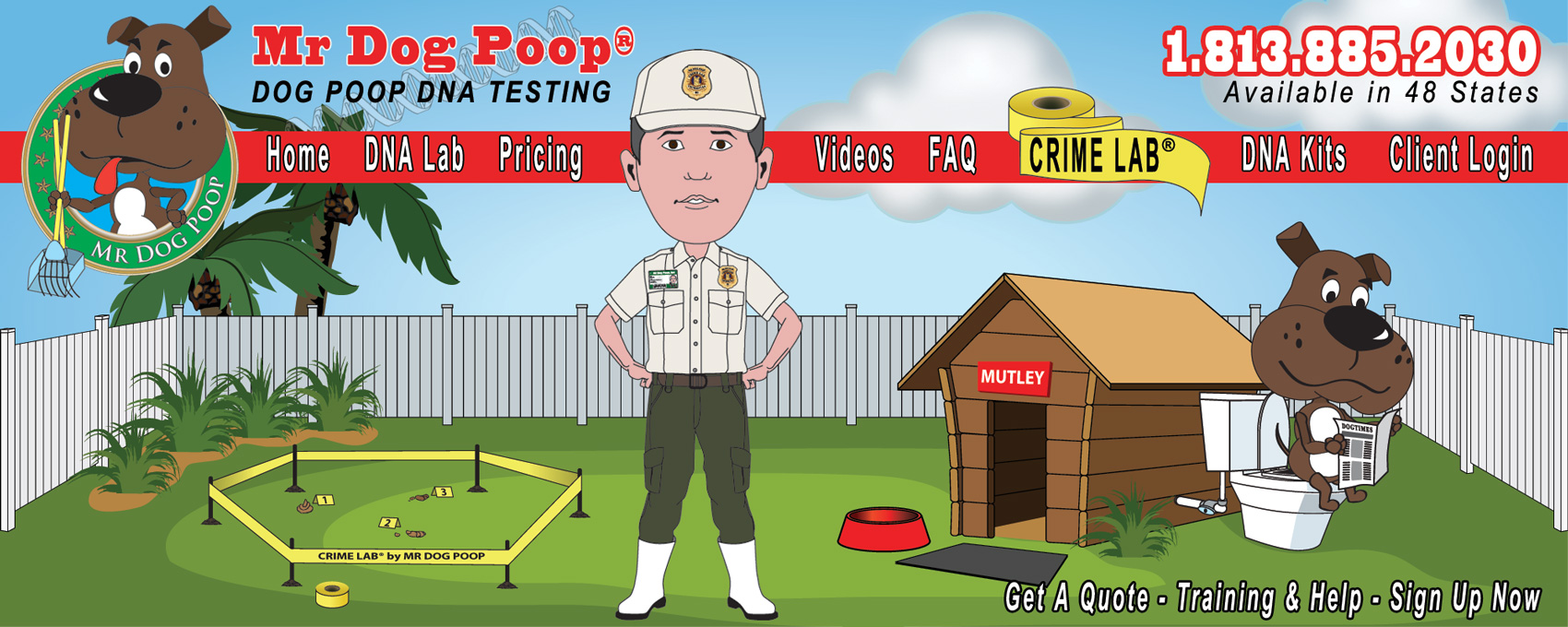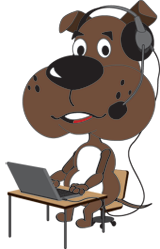The CDC (Centers for Disease Control) warns that one single dog dropping can contain 3 million fecal bacteria, along with parasites and viruses that can that be passed to humans adults and children as well as other pets.
This chart shows some of the Parasites, Bacteria and Viruses that could be present in dog feces.
| Parasites | Bacteria | Viruses |
| Cryptosporidium | Salmonella | Rabies |
| Giardia | E. coli | Parvovirus |
| Hookworms | Campylobacter | Coronavirus |
| Roundworms | Leptospira | Distemper |
| Tapeworms | MRSA | Canine Hepatitis |
If you are infected by any of these though contact with dog feces, the symptoms can range from fever, rashes, diarea, vomoting, blindness, liver or nervous system damage or even death.
A dog's digestive system can handle just about anything and often does making it's poop very toxic. In fact, a single dog will produce more bacteria in one day than a person, a horse and a cow combined.

You don't have to have a PHD to understand that dog poop is bad for you and that you should avoid it if possible.
Cleaning up dog poop in your yard needs to be done regularly or you will quickly have a toxic and dangerous minefield of feces. On average, dogs poop twice per day which adds up to about 14 piles of poop in just one week, and that is just one dog. That has the same amount of bacteria as 14 wheelbarrow loads of combined human poop, cow poop and horse poop.
Dog feces can contain parvovirus, whipworms, hookworms, roundworms, threadworms, campylobacteriosis, giardia, and coccidia. If left unattended, these parasites bacteria and viruses will contaminate the water, soil, and can infect both pets and humans, especially vulnerable are young children playing in the contaminated yard.
The microscopic Hookworm larvae can be passed to another pet or person directly through the skin or by accidental ingestion as can other bacteria.
Simply walking in a infected yard then entering a home will track the bacteria and can infect anyone in the household and quickly sicken or hospitalize high risk individual such as young children, pregnant women or elderly. Individuals with an autoimmune disease, flu or reduced ability to fight infections are at risk of hospitalization or even death.
Many people ignore these issues saying they don't use the yard, it is just for their dogs. But those same dogs walk in the yard indiscriminately and then enter your home with out removing their shoes spreading the diseases, bacteria and parasites into your carpet, beds and clothing.
In fact, testing of average sidewalks where dogs are commonly walked showed extremely hight levels of bacteria transferred from the dogs feet and onto human shoes. That is onto the shoes of people that don't even have pets but innocently walk down their neighborhood sidewalk for exercise.
|
photo of child paying in yard |
Common HEALTH Concerns
Women who are pregnant are at risk of several zoonotic diseases from dog feces. If you are pregnant, wear a mask when you scoop.
Children who have open cuts, sores, or dirty hands. Even though you cannot see the fecal matter, it does not mean that fecal matter is not present. Round worms, tape worms, and whip worms, can have eggs that remain in the soil for years. A child puts a dirty hand in their mouth or scratches an eye and transfers an egg.
People with suppressed immune systems due to disease or are taking drugs that lower the immune system should not scoop dog feces. They are once again at risk from disease.
Safety & Prevention
To avoid potential infection, dog feces should be removed from the yard every 1 - 7 days, depending on the size of the dog and number of dogs in the household. Larger dogs will need more frequent cleanups, as will households with more than 1 dog. A family with a Chiwawa will have a much lower environmental impact than a family with a Saint Bernard.
Whatever the case is, please act responsible and clean up after your pets for your health and the safety of your neighbors, natural wild life and our fragile eco system.
And ask your neighbors to clean up after their pets because when the parasites run off into the ground water and your dog drinks from a puddle, creek or pond then your dog will ingest the parasites causing sickness and even death. If your children walk barefoot though a puddle in your own yard they can contract a disease or parasites directly from your neighbors pets.
Why doesn't anyone know this?
People realized the dangers in human poop hundreds of years ago and have created waste systems and water treatment processes to keep us safe. Without these facilities we would be have shorter life spans and always be at risk for epidemic outbreaks.
While civilizations have dealt with the problem of human waste the issue of pet waste has never been addressed because it was never such a big problem. But now with nearly as many pets as people in this country it is quickly becoming a serious environmental problem, health issue and nuisance.
More and more municipalities are having to deal with the issue because of contaminated water supplies, high bacteria levels preventing the use of beaches, parks and rivers all caused by dog poop. They are creating laws requiring yard cleanups, fining offenders and even requiring DNA profiles of registered dogs to scooper enforce laws.
The problem will only get worse as more and more people have pets and those pets continue to use our backyards as their toilet.
In time, pet waste removal might be part of normal sanitation like sewers and weekly trash pickups, but today the responsibility is left to the individual pet owners.
If you refuse to deal with the pet waste problem it could kill your pet or even a member of your family. If your neighbor refuses to deal with their pet wast it could also sicken or kill a member of your family.
Dog poop needs to be taken very seriously and not ignored.
If humans were pooping in their yard, on sidewalks and such there would be an uproar and people would fight to stop the problem. But dogs are left to do just that in spite of the fact that dog waste carries higher bacteria levels, contains dangerous parasites and poses a significantly higher threat than than human waste.
Our love for pets and lack of responsibility is degrading our environment, endangering public health and creating a situation that cannot be ignored.
The questions we have
to ask you are:
Will you wait until dog poop causes a serious problem with a
member of your family?
Or will you take dog poop a little more seriously to prevent that
from happening?
You don't have to believe what you read on MrDogPoop.com but you should certainly believe the data and studies from the CDC, EPA, ASPCA and other high level institutions. The information is out there, people have just chosen to ignore it because nobody wants to pick up poop!
How bad is the dog poop problem anyway?
In just a couple of days, 100 dogs can deposit enough bacteria to temporarily close a bay, and all watershed areas within 20 miles of it, to swimming and fishing.
Think about that for a minute. 100 dogs can contaminate 20 miles of rivers, lakes, streams and runoff areas.
Think about the numbers of dogs in your city and what kind of damage they do every 2 days when their poop is not picked up.
80+ million dogs living in the United States create 10 million tons of feces annually, polluting waterways and posing a threat to public health.
10 million tons is a lot of dog poop! That is 20 BILLION Pounds of Dog POOOP!
In fact according to the New York Times, it is enough to fill a line of fully loaded tractor trailers stretching from Seattle Washington to Boston Massachusetts.
The damage being done from unscooped poop is massive and only recently have government agencies begun address the problem with stricter laws and penalties. Some municipalities require the pick up of dog poop in your yard within 24 hours in an effort to safeguard the local environment.
This is not something we can continue to ignore! It is quickly becoming a serious environmental disaster.




